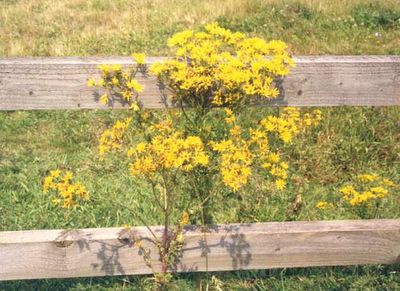
Due to the warm weather in July, the humble ragwort seems rather early this year. Here in Devon it appears in profusion, even in places where it has been persecuted for years.
Ragwort, thou humble flower with tattered leaves
I love to see thee come & litter gold,
What time the summer binds her russet sheaves;
Decking rude spots in beauties manifold,
That without thee were dreary to behold,
Sunburnt and bare-- the meadow bank, the baulk
That leads a wagon-way through mellow fields,
Rich with the tints that harvest's plenty yields,
Browns of all hues; and everywhere I walk
Thy waste of shining blossoms richly shields
The sun tanned sward in splendid hues that burn
So bright & glaring that the very light
Of the rich sunshine doth to paleness turn
& seems but very shadows in thy sight.




2 comments:
Ragwort contains alkaloids poisonous to horses, cattle, sheep, deer and hare. It is difficult to eradicate and potentially fatal, being a cumulative poison which destroys the liver. Little can be done for an animal once toxic symptoms appear. This may not have been fully appreciated in Clare's day but it is now.
See:http://www.defra.gov.uk/environ/weedsact/default.htm
This ia a wonderful poem. Being a fantastic and accurate observer of nature, Clare really appreciated the beauty and value of 'weeds', writing many times about thistles and dandlelions.
DEFRA estimate that Jacobea Vulgaris (Common Ragwort) supports 200 invertebrates, of which 30 are entirely dependent on it as their foodplant. Only this one species of thw 19 UK species of Ragwort found in the UK contains the Alkaloids harmful to horses; the greatest threat to horses is when ragwort is inadvertantly crop in a hay crop and feed as dried hay, making it harder for the horses to differentiate.
Post a Comment